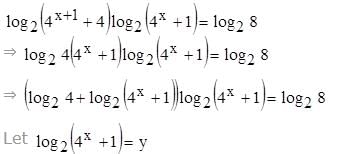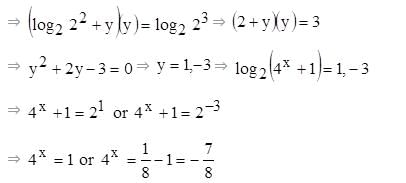JEE Exam > JEE Questions > If log2(4x+1+ 4)log2(4x + 1) = log2 8, then x...
Start Learning for Free
If log2(4x+1 + 4)log2(4x + 1) = log2 8, then x equals
- a)-1
- b)0
- c)16
- d)64
Correct answer is option 'B'. Can you explain this answer?
Verified Answer
If log2(4x+1+ 4)log2(4x + 1) = log2 8, then x equalsa)-1b)0c)16d)64Cor...



⇒ x = 0
Most Upvoted Answer
If log2(4x+1+ 4)log2(4x + 1) = log2 8, then x equalsa)-1b)0c)16d)64Cor...
Given:
log2(4x + 1) * log2(4x - 1) = log2 8
To find the value of x, we need to solve the given equation. Let's break down the problem into smaller steps to understand the solution.
Step 1: Simplify the equation
Using the property of logarithms, we can rewrite the equation as:
log2((4x + 1) * (4x - 1)) = log2 8
Step 2: Simplify the right side of the equation
Since log2 8 is equal to log2(2^3), we can simplify it further:
log2((4x + 1) * (4x - 1)) = log2(2^3)
Step 3: Apply the property of logarithms
According to the property loga(b * c) = loga(b) + loga(c), we can rewrite the left side of the equation as:
log2(4x + 1) + log2(4x - 1) = log2(2^3)
Step 4: Simplify the right side of the equation
Since 2^3 is equal to 8, we can further simplify the equation:
log2(4x + 1) + log2(4x - 1) = log2 8
Step 5: Apply the property of logarithms
According to the property loga(b) + loga(c) = loga(b * c), we can combine the logarithms on the left side of the equation:
log2((4x + 1) * (4x - 1)) = log2 8
Step 6: Cancel out the logarithms
Since log2((4x + 1) * (4x - 1)) = log2 8, we can conclude that
(4x + 1) * (4x - 1) = 8
Step 7: Solve the equation
Expanding the equation (4x + 1) * (4x - 1) = 8, we get:
16x^2 - 1 = 8
Rearranging the equation, we have:
16x^2 = 9
Step 8: Find the value of x
Dividing both sides of the equation by 16, we get:
x^2 = 9/16
Taking the square root of both sides, we have:
x = ±√(9/16)
Since x cannot be negative, we take the positive square root:
x = √(9/16)
Simplifying the square root, we get:
x = 3/4
Therefore, the value of x is 3/4, which is equivalent to 0.75.
Hence, the correct answer is option B) 0.
log2(4x + 1) * log2(4x - 1) = log2 8
To find the value of x, we need to solve the given equation. Let's break down the problem into smaller steps to understand the solution.
Step 1: Simplify the equation
Using the property of logarithms, we can rewrite the equation as:
log2((4x + 1) * (4x - 1)) = log2 8
Step 2: Simplify the right side of the equation
Since log2 8 is equal to log2(2^3), we can simplify it further:
log2((4x + 1) * (4x - 1)) = log2(2^3)
Step 3: Apply the property of logarithms
According to the property loga(b * c) = loga(b) + loga(c), we can rewrite the left side of the equation as:
log2(4x + 1) + log2(4x - 1) = log2(2^3)
Step 4: Simplify the right side of the equation
Since 2^3 is equal to 8, we can further simplify the equation:
log2(4x + 1) + log2(4x - 1) = log2 8
Step 5: Apply the property of logarithms
According to the property loga(b) + loga(c) = loga(b * c), we can combine the logarithms on the left side of the equation:
log2((4x + 1) * (4x - 1)) = log2 8
Step 6: Cancel out the logarithms
Since log2((4x + 1) * (4x - 1)) = log2 8, we can conclude that
(4x + 1) * (4x - 1) = 8
Step 7: Solve the equation
Expanding the equation (4x + 1) * (4x - 1) = 8, we get:
16x^2 - 1 = 8
Rearranging the equation, we have:
16x^2 = 9
Step 8: Find the value of x
Dividing both sides of the equation by 16, we get:
x^2 = 9/16
Taking the square root of both sides, we have:
x = ±√(9/16)
Since x cannot be negative, we take the positive square root:
x = √(9/16)
Simplifying the square root, we get:
x = 3/4
Therefore, the value of x is 3/4, which is equivalent to 0.75.
Hence, the correct answer is option B) 0.

|
Explore Courses for JEE exam
|

|
Similar JEE Doubts
If log2(4x+1+ 4)log2(4x + 1) = log2 8, then x equalsa)-1b)0c)16d)64Correct answer is option 'B'. Can you explain this answer?
Question Description
If log2(4x+1+ 4)log2(4x + 1) = log2 8, then x equalsa)-1b)0c)16d)64Correct answer is option 'B'. Can you explain this answer? for JEE 2025 is part of JEE preparation. The Question and answers have been prepared according to the JEE exam syllabus. Information about If log2(4x+1+ 4)log2(4x + 1) = log2 8, then x equalsa)-1b)0c)16d)64Correct answer is option 'B'. Can you explain this answer? covers all topics & solutions for JEE 2025 Exam. Find important definitions, questions, meanings, examples, exercises and tests below for If log2(4x+1+ 4)log2(4x + 1) = log2 8, then x equalsa)-1b)0c)16d)64Correct answer is option 'B'. Can you explain this answer?.
If log2(4x+1+ 4)log2(4x + 1) = log2 8, then x equalsa)-1b)0c)16d)64Correct answer is option 'B'. Can you explain this answer? for JEE 2025 is part of JEE preparation. The Question and answers have been prepared according to the JEE exam syllabus. Information about If log2(4x+1+ 4)log2(4x + 1) = log2 8, then x equalsa)-1b)0c)16d)64Correct answer is option 'B'. Can you explain this answer? covers all topics & solutions for JEE 2025 Exam. Find important definitions, questions, meanings, examples, exercises and tests below for If log2(4x+1+ 4)log2(4x + 1) = log2 8, then x equalsa)-1b)0c)16d)64Correct answer is option 'B'. Can you explain this answer?.
Solutions for If log2(4x+1+ 4)log2(4x + 1) = log2 8, then x equalsa)-1b)0c)16d)64Correct answer is option 'B'. Can you explain this answer? in English & in Hindi are available as part of our courses for JEE.
Download more important topics, notes, lectures and mock test series for JEE Exam by signing up for free.
Here you can find the meaning of If log2(4x+1+ 4)log2(4x + 1) = log2 8, then x equalsa)-1b)0c)16d)64Correct answer is option 'B'. Can you explain this answer? defined & explained in the simplest way possible. Besides giving the explanation of
If log2(4x+1+ 4)log2(4x + 1) = log2 8, then x equalsa)-1b)0c)16d)64Correct answer is option 'B'. Can you explain this answer?, a detailed solution for If log2(4x+1+ 4)log2(4x + 1) = log2 8, then x equalsa)-1b)0c)16d)64Correct answer is option 'B'. Can you explain this answer? has been provided alongside types of If log2(4x+1+ 4)log2(4x + 1) = log2 8, then x equalsa)-1b)0c)16d)64Correct answer is option 'B'. Can you explain this answer? theory, EduRev gives you an
ample number of questions to practice If log2(4x+1+ 4)log2(4x + 1) = log2 8, then x equalsa)-1b)0c)16d)64Correct answer is option 'B'. Can you explain this answer? tests, examples and also practice JEE tests.

|
Explore Courses for JEE exam
|

|
Signup for Free!
Signup to see your scores go up within 7 days! Learn & Practice with 1000+ FREE Notes, Videos & Tests.
























